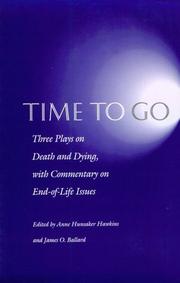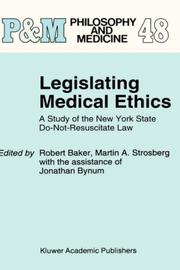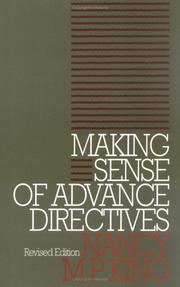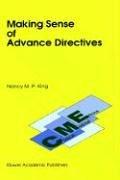| Listing 1 - 10 of 77 | << page >> |
Sort by
|
Book
ISBN: 0306444623 Year: 1993 Publisher: New York : Insight Books,
Abstract | Keywords | Export | Availability | Bookmark
 Loading...
Loading...Choose an application
- Reference Manager
- EndNote
- RefWorks (Direct export to RefWorks)
The staggering advances in medical technology over the past few decades have enormously increased the number of treatment techniques available at the concluding stages of life. For countless patients and families, this situation is challenging and confusing, especially if an unexpected crisis occurs in a hospital or hospice, or at home. Final Choices is an extraordinary presentation of the issues, options, and obstacles concerning the right and ability of a dying person to control his or her future. George M. Burnell, M.D., a psychiatrist with direct experience in grief and bereavement counseling, emphasizes the development of open communication within the family and with members of the treatment staff. He sensitively discusses many important concerns so as to facilitate such dialogue, for example: the questions to ask a doctor at the onset of illness; the fear of pain or physical deterioration (e.g., from AIDS or chemotherapy); the spiritual, legal, and financial counsel available to patient and family; the medical "choices" a patient may have in pursuit of a dignified death; the official documents to prepare (e.g., a living will, a power of attorney, a healthcare proxy) for the patient's last wishes; the possible merits of hospice care for the medical and spiritual benefits of patient and family. Featuring poignant case histories, Dr. Burnell describes in clear, nontechnical language the painful ethical and legal complications that surface when patients and families do not pursue the possibility of "do not resuscitate" (DNR) orders in lieu of life-prolonging measures. Unlike other books in the field, Final Choices does not underplay the dilemmas posed by modern medical technology. Featuring a fascinating breakdown of landmark cases, the author weighs the opinions posed by the medical and legal communities, and the increasingly important role of a bioethics committee in its capacity as a family-hospital mediator. An extensive list of sample forms, charts, a helpful glossary of medical terms, and a diagram of states' policies on "right-to-die" issues make this inspirational book invaluable to the terminally ill and their families, experts in traditional and alternative medical treatment, psychiatrists, clinical psychologists, members of the legal profession and the clergy, healthcare legislators, hospital administrators, and social workers.
Terminal care. --- Right to die. --- Do-not-resuscitate orders. --- Hospice care. --- Death.

ISBN: 0812215192 Year: 1995 Publisher: Philadelphia University of Pennsylvania press
Abstract | Keywords | Export | Availability | Bookmark
 Loading...
Loading...Choose an application
- Reference Manager
- EndNote
- RefWorks (Direct export to RefWorks)
This unusual book presents three prize-winning one-act plays on the hard choices that patients, their families, and their physicians often face at the end of life. The purpose of the volume is to increase awareness and knowledge about advance directives and, beyond that, to facilitate discussion about the many complicated issues surrounding death and dying today. Each play is followed by critical commentary. The introduction provides lucid and succinct explanation of the human, ethical, and legal contexts for the rights of patients in the United States. The volume includes appendices providing values history and living will declarations, durable power of attorney statements, and resource information.
American drama --- Death --- Do-not-resuscitate orders --- Right to die --- Drama
Book
ISBN: 1282319760 9786612319761 1135333645 1843145340 9781135333645 Year: 2004 Publisher: London, U.K. Portland, Or. Cavendish
Abstract | Keywords | Export | Availability | Bookmark
 Loading...
Loading...Choose an application
- Reference Manager
- EndNote
- RefWorks (Direct export to RefWorks)
This book allows you to decide whether a living will is for you and offers a plain English living will to make your wishes known and how to grant an EPA allowing those you trust to manage your affairs.
Right to die --- Advance directives (Medical law) --- Do-not-resuscitate orders --- Law and legislation
Book
Year: 2009 Publisher: Washington : U.S. G.P.O.,
Abstract | Keywords | Export | Availability | Bookmark
 Loading...
Loading...Choose an application
- Reference Manager
- EndNote
- RefWorks (Direct export to RefWorks)
Advance directives (Medical care) --- Do-not-resuscitate orders --- Patient refusal of treatment --- Right to die --- Older people --- Long-term care
Book
Year: 2016 Publisher: Washington : U.S. Government Publishing Office,
Abstract | Keywords | Export | Availability | Bookmark
 Loading...
Loading...Choose an application
- Reference Manager
- EndNote
- RefWorks (Direct export to RefWorks)
Advance directives (Medical care) --- Health planning --- Long-term care of the sick --- Do-not-resuscitate orders --- Terminally ill --- Patients --- Decision making. --- Care --- Legal status, laws, etc. --- United States.

ISBN: 1593320213 9781593320218 1931202400 9781931202404 Year: 2002 Publisher: New York LFB Scholarly Pub.
Abstract | Keywords | Export | Availability | Bookmark
 Loading...
Loading...Choose an application
- Reference Manager
- EndNote
- RefWorks (Direct export to RefWorks)
Right to die --- Death, Right to --- Death with dignity --- Natural death (Right to die) --- Death --- Life and death, Power over --- Advance directives (Medical care) --- Do-not-resuscitate orders --- Euthanasia --- Suicide --- States. --- Government policy
Book
ISBN: 9782020948487 2020948486 Year: 2008 Publisher: Paris: Seuil,
Abstract | Keywords | Export | Availability | Bookmark
 Loading...
Loading...Choose an application
- Reference Manager
- EndNote
- RefWorks (Direct export to RefWorks)
Terminal care --- Hospital care --- Hospital and community --- Soins en phase terminale --- Éthique médicale --- Ordres de réanimation. --- Euthanasie passive. --- Soins terminaux. --- Death --- Medical ethics --- Do-not-resuscitate orders --- Intensive care units --- Resuscitation Orders --- ethics

ISBN: 0792329953 9048144388 9401585938 Year: 1994 Volume: 48 Publisher: Dordrecht Boston Kluwer Academic Publishers
Abstract | Keywords | Export | Availability | Bookmark
 Loading...
Loading...Choose an application
- Reference Manager
- EndNote
- RefWorks (Direct export to RefWorks)
Biologie humaine -- Morale et aspects éthiques --- Biomedical ethics --- Biomedische ethiek --- Biomédecine -- Morale et aspects éthiques --- Deontologie [Medische ] --- Deontology [Medical ] --- Déontologie médicale --- Ethics [Medical ] --- Ethiek [Medische ] --- Ethique médicale --- Medical care -- Moral and ethical aspects --- Medical deontology --- Medical ethics --- Medicine -- Moral and ethical aspects --- Medische deontologie --- Medische ethiek --- Morale et médecine --- Morale médicale --- Médecine -- Innovations -- Morale et aspects éthiques --- Médecine -- Morale et aspects éthiques --- Médecine et morale --- Politique sanitaire -- Morale et aspects éthiques --- Soins médicaux -- Morale et aspects éthiques --- Éthique clinique --- Do-not-resuscitate orders --- -Do-not-resuscitate orders --- -Medical ethics --- DNR code, do not resuscitate, do not reanimate, niet te reanimeren --- DNR orders --- Advance directives (Medical care) --- DNR, code ne pas réanimer --- #GBIB:CBMER --- Clinical ethics --- Ethics, Medical --- Health care ethics --- Medical care --- Medicine --- Bioethics --- Professional ethics --- Nursing ethics --- Social medicine --- Resuscitation --- Right to die --- Law and legislation --- Moral and ethical aspects --- Case studies --- Natural law --- Medical law --- Professional ethics. Deontology --- New York City --- Do-not-resuscitate orders - Law and legislation - New York (State) --- Do-not-resuscitate orders - Moral and ethical aspects. --- Do-not-resuscitate orders - New York (State) - Case studies. --- New York City [New York]

ISBN: 0878406050 Year: 2007 Publisher: Washington, D.C. Georgetown University Press
Abstract | Keywords | Export | Availability | Bookmark
 Loading...
Loading...Choose an application
- Reference Manager
- EndNote
- RefWorks (Direct export to RefWorks)
Advance directives - such as living wills and health care proxies - are documents intended to declare and preserve the health care choices of patients if they become unable to make their own decisions. This book provides a comprehensive overview of advance directives and clear, practical directions for writing and interpreting them. Nancy M.P. King provides a legal, philosophical, and historical analysis of the moral and legal force of advance directives. She explains the types and models of advance directives currently in use and offers guidelines for individuals seeking to write, read, and use directives to promote individuals' health care choices within the laws of their own states. King emphasizes that advance directives are not orders given by patients to their doctors; instead, they are documents that invite conversation between doctors and patients about health care decisions of great importance. The purpose of advance directives is to support patients' health care choices, and the book promotes a thoughtful use of advance directives that is best calculated to achieve that purpose, whatever form individual advance directives may take.This new edition has been updated to reflect the many changes in advance directive statutes since 1991, including expanded discussions of health care proxy statutes, the impact of the Patient Self-Determination Act and the Supreme Court's Cruzan decision. King also has extended her analysis of the implications for advance directives of managed care, resource allocation, resource scarcity, and the debate over futile treatment at the end of life. "Making Sense of Advance Directives" is a valuable handbook for patients, health care providers and administrators, patient counselors, lawyers, policymakers, and any individual interested in advance directives.
Medical law --- Professional ethics. Deontology --- United States --- Do-not-resuscitate orders --- voorafgaande wilsverklaring (voorafgaande negatieve wilsverklaring, levenstestament, euthanasieverklaring) --- weigering van behandeling --- Death, Right to --- Death with dignity --- Natural death (Right to die) --- Advance directives (Medical care) --- DNR orders --- testament de vie (directive anticipée) --- refus de traitement --- Do-not-resuscitate orders. --- Right to die. --- Right to die --- Law and legislation. --- levenseinde (einde van het leven, levenseindebeslissing) --- Verenigde Staten --- #GBIB:CBMER --- Death --- Life and death, Power over --- Euthanasia --- Suicide --- Resuscitation --- Informed consent (Medical law) --- Medical laws and legislation --- Law and legislation --- fin de vie (décision de fin de vie) --- Etats Unis --- United States of America

ISBN: 0792311639 9401054959 9401133808 Year: 1991 Volume: 2 Publisher: Dordrecht Kluwer Academic
Abstract | Keywords | Export | Availability | Bookmark
 Loading...
Loading...Choose an application
- Reference Manager
- EndNote
- RefWorks (Direct export to RefWorks)
Law of obligations. Law of contract --- Right to die --- Do-not-resuscitate orders --- Droit à la mort --- Interruption de traitement --- Law and legislation --- Droit --- Advance directives (Medical care) --- #GBIB:CBMER --- Advance health care directives --- Advance healthcare directives --- Advance medical directives --- Advanced directives (Medical care) --- Directives, Advance (Medical care) --- Healthcare directives, Advance --- Medical directives, Advance --- Medical care --- Patient advocacy --- Droit à la mort --- Medical law
| Listing 1 - 10 of 77 | << page >> |
Sort by
|

 Search
Search Feedback
Feedback About UniCat
About UniCat  Help
Help News
News